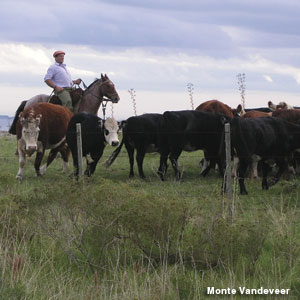Of Beef and Money in Uruguay
 Last week I came across two interesting articles which at first sight only appear to have in common that they talk about Uruguay. Both relayed some promising news.
Last week I came across two interesting articles which at first sight only appear to have in common that they talk about Uruguay. Both relayed some promising news.
The first one, at The Economist, talks about how Uruguayan banks welcomed a 41% increase in deposits by non-residents in 2008.
As I mentioned in my January 11 post, when the pension nationalization law passed in Argentina last year ten bank-owned pension funds - worth over $26 billion in total - were taken over by the government. The reaction from the Argentinean people was felt immediately. Those who could took their money out of the country, and capital outflows reached 7% of GDP in 2008. A lot of that money came from Argentina.
The other article, on Uruguayan beef, was from Bloomberg. In 2006, Argentinean farmers turned away from beef, both in response to the rise in soybean and other commodity prices, but also because of export caps imposed as an anti-inflationary measure by then-president Nestor Kirchner - the current president's husband. However, not all farmers switched crops. Some farmers sold their holdings in Argentina and moved to Uruguay in search of lower taxes.
Like export-destined Argentinian cattle, Uruguayan cattle are raised free of antibiotics, grass fed high-quality grasses, alfalfa, lotus, and clovers, and are free of bovine spongiform encephalopathy (mad cow disease).
This report from the US Department of Agriculture contrasts Uruguay's reaction to that of Argentina during the 1999-2001 recession, explaining how the Uruguayan government allowed market conditions to drive the recovery of the beef sector. Uruguay also instituted a comprehensive national animal identification program aimed at animal disease control, quality beef production and marketing. This ensures that ranchers and producers were complying with sanitary requirements and also fights illegal smuggling.
As a result, Uruguay is now aggressively targeting foreign markets for their beef exports. Because of this, the beef farmers are poised to benefit from a drop in demand and new Korean government restrictions on US beef. It's not only the Koreans who want Uruguayan beef. According to Bloomberg, Uruguay is the only South American country allowed to export fresh beef to the US after the US banned fresh beef exports from Argentina and Brazil due to sanitary issues. Uruguayan beef is also in demand in Russia and the EU.
In contrast to the wave of recent nationalizations in Argentina, Venezuela and other countries, Uruguay now allows a third of its agricultural property to be owned by foreigners.
Foreign investors are buying: Brazil's Marfrig Frigorificos & Comercio de Alimentos SA, the world's fourth-biggest meat packer, bought four Uruguayan slaughterhouses last year. PGG Wrightson Ltd. of New Zealand and George Soros's Buenos Aires-based Adecoagro have bought prime land near Uruguay's western border with Argentina.
The competitive advantage over Argentina is based on a flat 25% tax on farmers' incomes, quality products, lack of price controls, policies that encourage foreign investment and no tariffs on farm exports. Uruguay's bureaucracy is small enough that, as Uruguayan farmer Alberto Gramont put it, "if you want to speak to a minister you just ring him up."
In prior years Uruguay renegotiated its foreign debt and avoided default, another factor in its favor. The government has no desire to take over private banking funds, pension or otherwise, either.
As such, the Uruguayan economy is better placed to weather the world economic downturn.
That is good news for the region.
Fausta also blogs at Fausta's Blog





